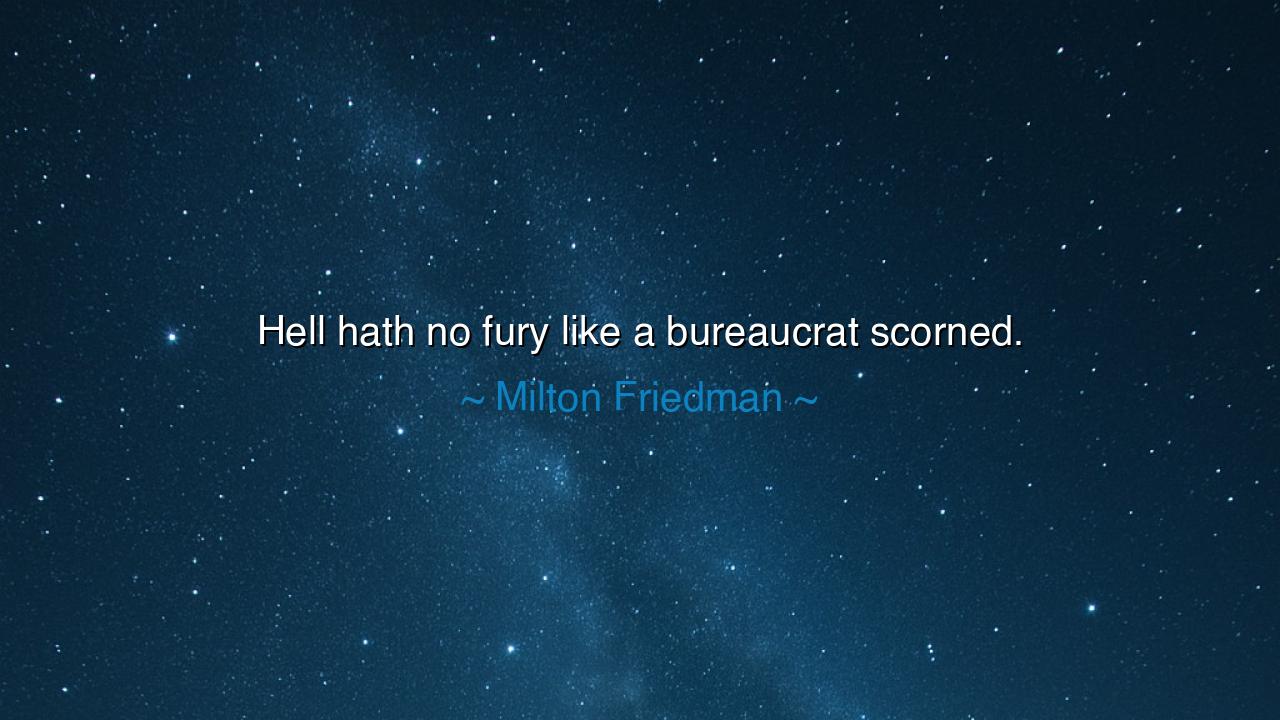
Hell hath no fury like a bureaucrat scorned.






Milton Friedman, sage of markets and fierce critic of government excess, once declared with razor wit: “Hell hath no fury like a bureaucrat scorned.” In this twisting of an old proverb, he revealed the peril of offending the guardians of red tape and regulation. For the bureaucrat, though cloaked in modest office, wields powers subtle and enduring: the power to delay, to obstruct, to bind with forms and decrees. To scorn such a figure is to awaken a wrath not of open battle, but of quiet suffocation.
The origin of this saying lies in Friedman’s lifelong struggle against what he saw as the creeping expansion of state power. He believed that bureaucracies, once created, sought survival above service, and that those who dared challenge them found themselves ensnared. The words echo his warning that the greatest danger to freedom is not always the tyrant with armies, but the bureaucrat with pen and file, who can bury initiative beneath endless procedure.
History gives proof. In the twilight of the Soviet Union, countless entrepreneurs and reformers attempted to breathe life into a stagnant economy. Yet they were crushed beneath a labyrinth of permits, inspections, and approvals—each controlled by bureaucrats who, once defied, wielded their fury to block progress. Here Friedman's warning takes flesh: scorned bureaucrats did not merely defend their turf; they strangled innovation itself.
Even in gentler lands, the same lesson holds. In ancient China, the scholar-officials of the imperial court could frustrate even the boldest emperor. When reforms threatened their privileges, they responded with delay, obstruction, and denunciation. Dynasties rose and fell, yet the bureaucracy endured, punishing those who dared to scorn its authority. Truly, its fury outlasted armies and emperors alike.
Therefore, O seekers of liberty, heed Friedman’s counsel. Beware not only the roaring of kings, but the whispers of clerks. The machinery of government, once angered, may grind down the strongest of wills. Yet also remember: to tame bureaucracy, one must balance courage with prudence, reform with patience. For the fury of the bureaucrat is quiet but enduring, and only wisdom can overcome it.






H:Gia Hann :3
Friedman’s remark seems to suggest a certain danger in bureaucratic systems: that when someone in power feels scorned, they may retaliate with considerable force. How often do we see bureaucrats acting out of personal grievances, and how much of this reflects the inherent flaws of bureaucratic systems? Is this an exaggeration, or is there a real risk that bureaucracy, when unchecked, can become a destructive force fueled by personal vendettas?
KTkhanh tran
This quote sheds light on the emotional weight behind bureaucracy that many people overlook. Could the passion or sense of justice that bureaucrats feel about their positions turn into a form of vengeance if they are wronged? How does this affect the efficiency of bureaucracy? If people within these systems can be so vindictive, how can we ensure that the work they do is objective and fair for the public?
TPTrang Pham
There’s something both humorous and alarming about this quote. It’s almost as if Friedman is suggesting that bureaucrats, who are often seen as cold and impersonal, are actually driven by deep emotions. Could this be true? Does this quote highlight the fragile human side of bureaucratic systems, or is it simply a commentary on how frustrating and unpredictable dealing with bureaucracy can be when things go wrong?
KNkha nguyen
Milton Friedman's quote makes me reflect on how bureaucracy often seems to operate with its own set of rules, regardless of public interest or fairness. When a bureaucrat feels wronged, could it lead to retaliation in a way that harms public services or processes? Is this what happens when bureaucracy loses sight of its purpose, becoming more about personal power than serving the public good?
DTTran Dinh Trung
This quote really highlights the intense power of bureaucracy and the emotional investment bureaucrats might have in their work. Is it possible that when someone is scorned within a system, they could become so motivated to wield power in destructive ways? Do we really underestimate how much impact a bureaucrat can have, particularly when they feel slighted or overlooked? It certainly makes me wonder about the hidden influences behind bureaucratic decisions.